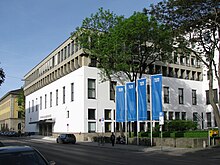TUM Department of Electrical and Computer Engineering
 | |
| Type | Public |
|---|---|
| Established | 1974 (independent department) |
| Dean | |
Academic staff | 46 professors (2017)[1] |
| Students | 4,160 (2020)[2] |
| Location | , , |
| Affiliations | TUM |
| Website | ei.tum.de |
 | |
The TUM Department of Electrical and Computer Engineering (TUM EI) (German: Fakultät für Elektrotechnik und Informationstechnik) is a department of the Technical University of Munich, located at its Munich campus.
History[]

The first lectures in the field of electricity at the Polytechnische Schule München were given as early as 1876 by the physicist Wilhelm von Bezold. Over the years, as the field of electrical engineering became increasingly important, a separate department for electrical engineering emerged within the mechanical engineering department. In 1967, the department was renamed the Faculty of Mechanical and Electrical Engineering, and six electrical engineering departments were permanently established.
In April 1974, the formal establishment of the new TUM Department of Electrical and Computer Engineering took place. While still located in the Munich campus, a new building is currently in construction on the Garching campus and the Department is expected to move by 2025.[3]
Chairs[]
The Department consists of 47 chairs and professorships:[4]
- Audio Information Processing (AIP)
- Automatic Control Engineering (LSR)
- Bio-inspired Information Processing (BAI)
- Biomedical Electronics (LBE)
- Circuit Design (LSE)
- Coding for Communications and Data Storage (COD)
- Cognitive Systems (ICS)
- Communication and Navigation (NAV)
- Communications Engineering (LNT)
- Communication Networks (LKN)
- Computational Neuroengineering (CNE)
- Computational Photonics (CPH)
- Control and Manipulation of Microscale Living Objects (MML)
- Data Processing (LDV)
- Electrical Drive Systems and Power Electronics (EAL)
- Electrical Energy Storage Technology (EES)
- Electronic Design Automation (EDA)
- Embedded Systems and Internet of Things (ESI)
- Energy Economy and Application Technology (EWK)
- Energy Conversion Technology (EWT)
- Environmental Sensing and Modeling (ESM)
- High Frequency Engineering (HFT)
- High Voltage Engineering and Switchgear Technology (HSA)
- Human-Machine Communication (MMK)
- Human-centered Assistive Robotics (HCR)
- Hybrid Electronic Systems (HES)
- Information-oriented Control (ITR)
- Integrated Systems (LIS)
- Line Transmission Technology (LUT)
- Machine Learning (MLI)
- Measurement Systems and Sensor Technology (MST)
- Media Technology (LMT)
- Microwave Engineering (HOT)
- Molecular Electronics (MOL)
- Nano and Quantum Sensors (NAN)
- Neuroelectronics (NEL)
- Physics of Electrotechnology (TEP)
- Power Transmission Systems (EEN)
- Quantum Electronics and Computer Engineering (QEC)
- Real-Time Computer Systems (RCS)
- Renewable and Sustainable Energy Systems (ENS)
- Robotics Science and System Intelligence (RSI)
- Security in Information Technology (SEC)
- Semiconductor Technology (HLT)
- Signal Processing Methods (MSV)
- Simulation of Nanosystems for Energy Conversion (SNE)
- Theoretical Information Technology (LTI)
Rankings[]
| University rankings | ||||||||||
|---|---|---|---|---|---|---|---|---|---|---|
| By subject – Global & National | ||||||||||
| ||||||||||
| CHE Ranking 2020 – National | ||||||||||
| ||||||||||
The TUM Department of Electrical and Computer Engineering has been rated as the top electrical engineering department in Germany by major rankings.[5][6] Globally, it is rated No. 17 by QS and No. 19 by ARWU.
The Times Higher Education World University Rankings does not rank individual subjects, though in engineering in general, TUM is ranked 24th globally and 1st nationally.[7]
References[]
- ^ "Facts and Figures". TUM Department of Electrical and Computer Engineering. Retrieved 22 December 2020.
- ^ "TUM Facts & figures". Technische Universität München. Retrieved 22 December 2020.
- ^ "Major milestone in new construction on Garching hightech campus". Technical University Munich. 25 July 2019. Retrieved 22 December 2020.
- ^ "Chairs and Professorships". TUM Department of Electrical and Computer Engineering. Retrieved 23 December 2020.
- ^ Jump up to: a b "QS World University Rankings by Subject 2021: Engineering - Electrical & Electronic". QS World University Rankings. Retrieved 5 March 2021.
- ^ Jump up to: a b "ShanghaiRanking's Global Ranking of Academic Subjects 2021". Academic Ranking of World Universities. Retrieved 28 May 2021.
- ^ Jump up to: a b "World University Rankings 2021 by subject: engineering". Times Higher Education World University Rankings. Retrieved 9 January 2021.
- ^ "Studying Electrical and Information Engineering in Germany". CHE University Ranking. Retrieved 31 December 2020.
- Technical University of Munich
- 1974 establishments in Germany
- Educational institutions established in 1974
- Electrical and computer engineering departments
